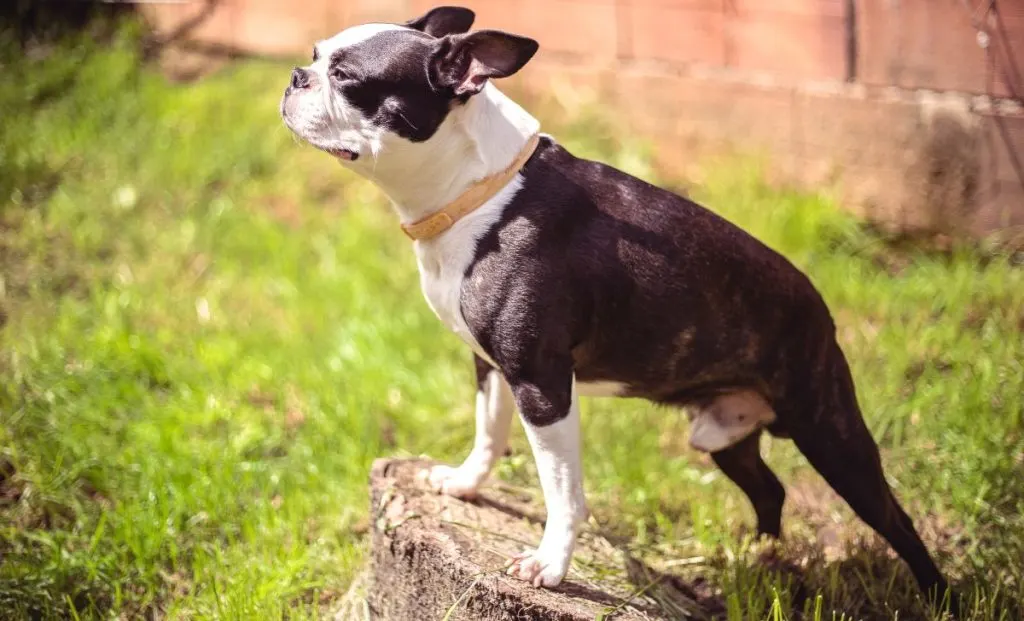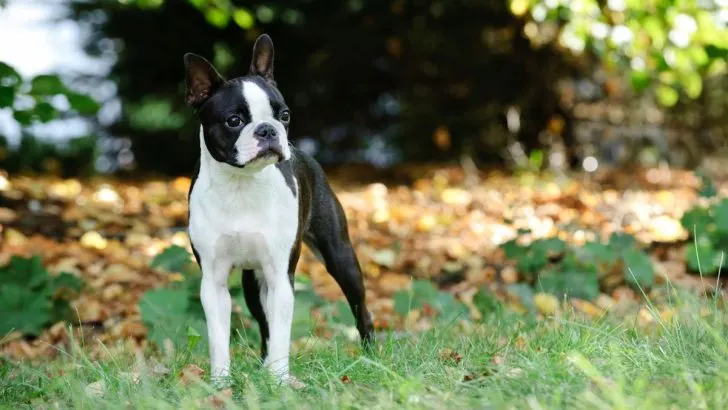Welcome to the ultimate guide for raising your own little American Gentleman!
With their distinctive tuxedo-like markings and charming personality, Boston Terriers are one of the cutest breeds that is cherished by dog lovers worldwide.
Today, we are going to show you the ultimate Boston Terrier growth chart that is guaranteed to guide you through the various stages of your puppy’s development – all the way from those adorable little furball days to becoming a robust adult.
Through personal stories and expert tips from professional breeders, we’ll share the secrets to a balanced diet, proper socialization, and appropriate exercise to keep those energetic little paws busy.
Ready, set, go!
Boston Terrier Weights & Heights Overview

These little guys are known for their friendly and intelligent nature, which is why they make excellent companions.
As you watch your Boston Terrier’s growth trajectory unfold, you’ll be amazed at how quickly they transform and develop.
It doesn’t matter if you go for a female Boston Terrier or a male, the following chart will provide valuable insights in their growth.
Keep in mind though, that this is a rough estimate. Individual dogs grow at different rates.
So, if you notice that one of your growing puppies has larger paws than the other, don’t worry, it is perfectly normal!
| Age (Months) | Weight (Male, lbs) | Weight (Female, lbs) | Height (Male, inches) | Height (Female, inches) |
| Birth | 0.5 – 1 | 0.5 – 1 | 2 – 3 | 2 – 3 |
| 1 | 2 – 4 | 2 – 3 | 3 – 4 | 3 – 4 |
| 2 | 4 – 6 | 3 – 5 | 4 – 6 | 4 – 6 |
| 3 | 6 – 8 | 5 – 7 | 6 – 8 | 6 – 8 |
| 4 | 8 – 10 | 7 – 9 | 7 – 9 | 7 – 9 |
| 5 | 10 – 12 | 9 – 11 | 8 – 10 | 8 – 10 |
| 6 | 12 – 14 | 11 – 13 | 9 – 11 | 9 – 11 |
| 7 | 14 – 16 | 13 – 15 | 10 – 12 | 10 – 12 |
| 8 | 16 – 18 | 15 – 17 | 11 – 13 | 11 – 13 |
| 9 | 18 – 20 | 17 – 19 | 12 – 14 | 12 – 14 |
| 10 | 20 – 22 | 18 – 20 | 13 – 15 | 12 – 14 |
| 11 | 20 – 23 | 18 – 21 | 13 – 16 | 12 – 15 |
| 12 | 20 – 25 | 18 – 22 | 15 – 17 | 12 – 16 |
As you can see, this Boston Terrier growth chart provides a comprehensive look at the average growth patterns for both genders. You may notice that the male Boston Terrier weights are slightly higher.
This is normal, of course! We can see these differences in various small breeds like the Maltese and the Miniature Schnauzer.
But, why do we even need this overview?
Well, understanding the growth rates and overall size of your Boston Terrier is pretty important because knowing the typical adult weight and height can help you keep tabs on your puppy’s progress and ensure they’re growing just right.
Boston Terrier Stages Of Puppy Development
Raising a Boston Terrier is hard work, but with regular play and good practices, you’ll be well-equipped to nurture your own American Gentleman.
During the puppy years, you’ll witness an astonishing transformation as your little Boston Terrier goes through various growth phases.
These phases include the neonatal stage, transitional stage, the socialization stage, and eventually the juvenile period.
Keep this overview handy, and you’ll be a step ahead in spotting any potential health issues early on.
Neonatal Period: Birth To 2 Weeks

Welcome to the very start of your Boston Terrier’s journey! The neonatal period spans from birth to about two weeks.
During this time, your puppy is highly dependent on their mother. Their eyes and ears are closed, and they rely solely on touch and smell to navigate their environment.
They have a strong rooting reflex, which means they instinctively find their mother’s teats to nurse. This ensures they get the nourishment they need.
Since puppies cannot regulate their body temperature, they rely on their mother and littermates for thermoregulation to stay warm.
It is crucial to understand that a Boston Terrier mother may experience extreme fragility during this time. Sometimes, for innate reasons, mother dogs may eat their puppies.
Additionally, this period is marked by rapid growth, with puppies typically doubling their birth weight by the end of this phase.
Every day brings noticeable changes as they grow and develop at an astounding rate.
Transitional Stage: 2 To 4 Weeks
Now things start to get exciting! The transitional period spans from 2 to 4 weeks and is a crucial period for your Boston Terrier puppies as they begin to bridge the gap between total dependency and the beginnings of socialization.
During this stage, your puppies will experience significant sensory development. Around 10 to 14 days, their eyes begin to open, revealing those adorable little peepers.
Shortly after, their ears open up around two weeks, and they start responding to sounds. You’ll notice them reacting to your voice, which is such a heartwarming moment.
Motor skills also see a huge leap during this time.
I remember watching my client’s Boston Terrier pups taking their first wobbly steps. They were so small but very determined – a unique trait that this breed showcases to the fullest. They would start to stand, walk, wag their tails, and even bark!
During this period, tooth development kicks in too.
Those tiny deciduous teeth (baby teeth) begin to erupt, and you might feel a gentle nibble on your fingers as they start exploring their environment through taste and touch.
This period also marks the beginning of their transition from their mother’s milk to solid food, although they still nurse frequently.
One of the most rewarding aspects of this stage of puppyhood is the bonding that happens.
Gentle handling by humans is incredibly beneficial and is a key component to introducing your Boston Terrier puppy to the socialization stage.
Socialization Stage: 4 To 12 Weeks

From 3 to 12 weeks, your Boston Terrier starts to explore the world around them. This socialization period is where the magic happens.
At the beginning of this stage, around 4 weeks, they typically weigh between 2 to 4 pounds and are about 4 to 6 inches tall.
During the first year, this period is crucial for setting a strong foundation in their growth trajectory.
Boston Terrier breeders often recommend exposing the puppies to a variety of stimuli during this stage.
We are talking about different sounds, sights, and environments to help them become well-rounded adults.
Having said that, it is recommended that dog owners introduce their puppy to gentle and friendly dogs, children, and various people.
You can take them for short car rides, visits to the vet, and even to puppy classes. The goal is to make each experience positive and rewarding.
it’s also a great time to start basic training. Simple commands like “sit,” “stay,” and “come” are easier for them to grasp during this period.
By the end of the stage, around 12 weeks, they can weigh between 6 to 10 pounds and measure about 7 to 9 inches tall.
They’ll need much exercise to burn off their boundless energy. That said, make sure your puppy gets the appropriate exercise to help develop their muscles and coordination.
Go for a game of fetch, a romp in the yard, or a gentle tug-of-war! Trust me, these activities will have your puppy leaping with happiness and joy!
Juvenile Period: 3 To 6 Months
During these months, your Boston Terrier will become more adventurous and playful. This is a critical time for their development as they start to test their boundaries and exhibit more independence.
It’s also when they learn the most from their environment and interactions, so keep those socialization and training sessions going strong.
By 6 months, your Boston Terrier will likely weigh between 10 to 14 pounds. Their rapid growth will start to taper off, but they’ll still need a balanced diet and regular exercise to support their development.
Keep an eye out for those adorable growth spurts that may have them looking a bit gangly at times!
Adolescence Stage 6 To 18 Months

This stage is all about refining those behaviors and continuing to build on the foundation you’ve set.
This is also a fantastic time to teach them some fun and more complex commands.
During this period, your Boston Terrier will reach most of their adult weight, which can range between 15 to 25 pounds, depending on the factors such as gender and genetics.
Their physical development will continue, and you’ll notice them maturing into their adult shape.
Keep up with the exercise, but be mindful of their joints and bones, which are still developing.
Adult Period 18 Months To 7 Years
Your Boston Terrier has now reached full maturity. Well, technically. You see, individual dogs may mature at different rates and it can happen that your adult dog is not yet fully a mature one.
This is the time when their personality truly shines, and they settle into a more predictable routine.
They enjoy mental stimulation, so puzzle toys and advanced training can keep them entertained.
Keeping your Boston Terrier fit and trim is all about regular exercise and a balanced diet – these little guys can easily pack on the pounds, just like many other breeds.
And don’t forget those routine vet visits!
Senior Period 7 Years And Older

As your Boston Terrier ages, they may slow down a bit and require adjustments to their diet and exercise routines.
As your Boston Terrier enters their senior years, they might start to experience joint issues.
To help keep them comfortable and mobile, consider adding glucosamine and chondroitin to their diet. But, just make sure to check with your vet first!
Regular veterinary care becomes even more important in these years to monitor for age-related conditions.
So, whenever you feel like you need help with your senior pup, make sure to reach your vet as soon as possible.
Stick to the recommended amount of gentle exercises and provide plenty of love and comfort.
Their years of age may be showing, but their heart is still young!
How Big Do Boston Terriers Get?
Boston Terriers are a small breed, with most adults weighing between 15 to 25 pounds and standing about 15 to 17 inches tall at the withers.
According to the official American Kennel Club standards (AKC) Bostons have a sturdy, muscular build. This can make them appear larger than they actually are!
At What Age Is A Boston Terrier Fully Grown?

These little Gentlemen usually hit their full height and length by 12 to 14 months, but they keep bulking up with muscle until they’re around 18 months old.
This means that while they may appear fully grown in height and length by one year, they may still be gaining weight and muscle tone for a few more months.
Do Boston Terriers Calm Down With Age?
A lot of dog owners want to know the answer to this question and I have some good news. Yes, Boston Terriers do tend to calm down with age!
As they transition into adulthood and later into their senior years, they generally become more relaxed and less hyperactive.
Regular exercise and consistent training throughout their puppy years can help manage their energy levels and contribute to a calmer adult dog.
By following this Boston Terrier growth chart, you can track your puppy’s progress and provide the appropriate care at each phase of their life!
Good luck and happy growing!

Meet Iram, a devoted veterinarian, passionate dog lover, and current Ph.D. candidate at Utrecht University in the Netherlands. Seamlessly blending her roles as a vet and content writer, Iram channels her love for dogs into heartfelt narratives.
Since childhood, Iram nurtured a dream of becoming a vet, a passion that runs deep in her family. Having now fulfilled that dream, she’s eager to share her acquired knowledge. In her writing, Iram not only explores the emotional bond between humans and their canine friends but also integrates her veterinary expertise, offering readers a holistic understanding of their beloved pets.
